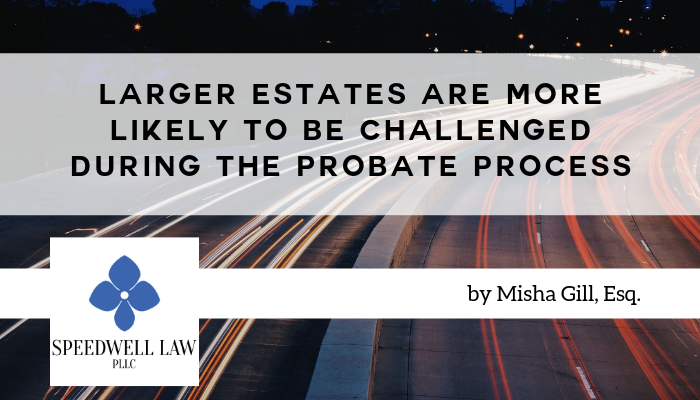
Larger Estates Are More Likely to be Challenged During the Probate Process
Nobody wants to think about the inevitability that we will die, let alone the thought of our loved ones squabbling over our estate long after we’ve passed—but the fact of the matter is, when you have a larger estate, your will is far more likely to be challenged during the probate process. It’s long been said that weddings, births and funerals bring out the worst in people—they’re emotionally-fraught events—and the death of a loved one can certainly bring out long-buried pain and simmering resentments. When a will unevenly distributes significant assets among loved ones, the possibility becomes even greater.
Even if you’re not a multi-millionaire, you’re wise to consult with an estate planning attorney. It’s not just for protecting your assets from greedy graspers; a good estate planning attorney can help you plan for a number of different scenarios, including mental or physical incapacitation requiring long-term care.
Why and How Do People Contest Wills?
Whether it’s family resentments over who took care of the parents, wanting a debt repaid or simply that one sibling feels they should have gotten the Bentley instead of the Honda Civic, there are a number of reasons that someone may choose to contest a will. Anyone who is named in the will, or who would have been an heir if you died without a will, has standing to challenge the will. Your will can be challenged on several main factors:
- Mental capacity. Generally, for a will to be legally valid, the writer of the will (the testator) has to be of sound mind. This means that the testator knows the nature and extent of her assets, that she is creating a will and understands who she is leaving her property to.
- It’s not actually a will, or it’s trying to do something unenforceable. Wills can be challenged on legal validity. Every state has different laws regarding how a will is signed and witnessed. If that is found to be lacking, the entire will can be thrown out. On the other hand, wills can be contested when they try to do something illegal or unenforceable, like leaving your billions to your cat.
- The will is fake, or there’s a newer one. It sounds like the plot of a soap opera, but it happens—and the bigger your estate is, the more likely that someone will try to create a fake will or claim that you made a newer one. (Benefiting them, of course.)
- Undue influence. Sadly, sometimes folks are at the mercy of their caretakers, especially when long illnesses are involved. Your will can be challenged if an heir or potential heir claims that you were forced, coerced or threatened into distributing your assets a certain way.
When a will is challenged in probate court, the court will decide whether the entire will is invalid or if there are only parts that are unenforceable. The parts that are thrown out are then treated as if you had never written a will at all. State intestacy laws will then apply. That’s why I highly recommend making your will with an estate planning attorney—you’ll have peace of mind that your will is far less likely to be overturned during probate.
Follow the Speedwell Blog HERE.
Schedule Your Consultation with Our Alexandria Estate Planning Attorney
Misha Gill is an Alexandria estate planning attorney for his firm, Speedwell Law, PLLC. If you would like assistance in setting up your own will, living trust, and other estate planning documents, Misha can be reached at (703) 553-2577 or [email protected].
This post, including any of its contents or links, is not intended to provide you with legal advice. It provides personal perspectives on legal news and developments. Reading this post, leaving a comment, or communicating with its author by email or over the Internet does not create any attorney-client relationship.





